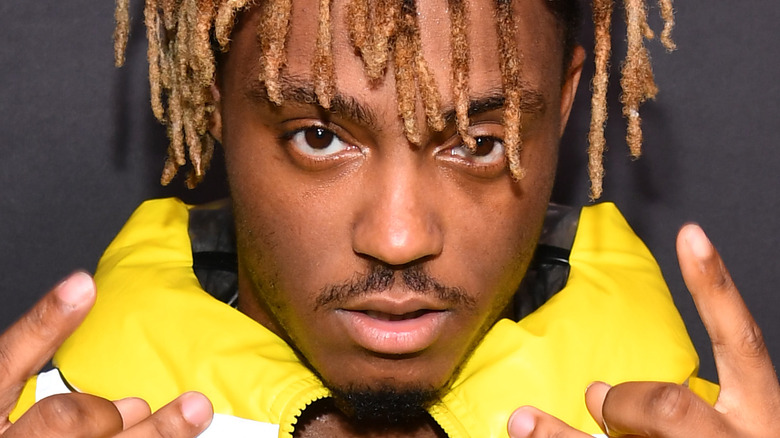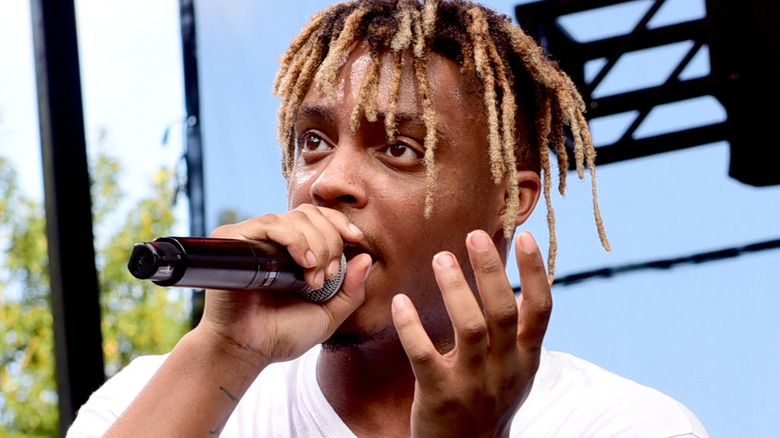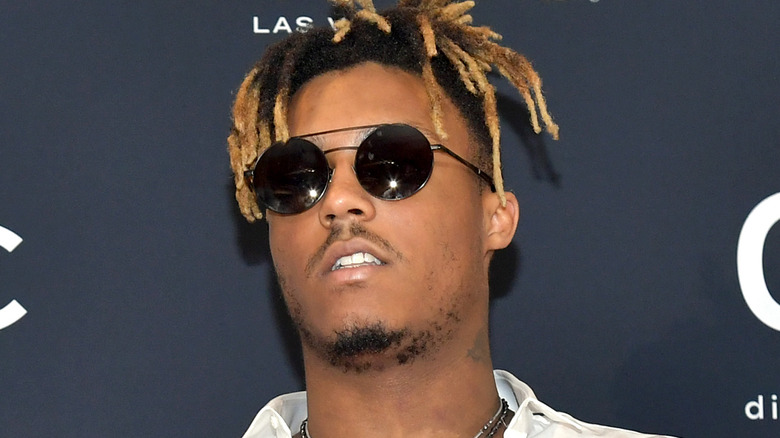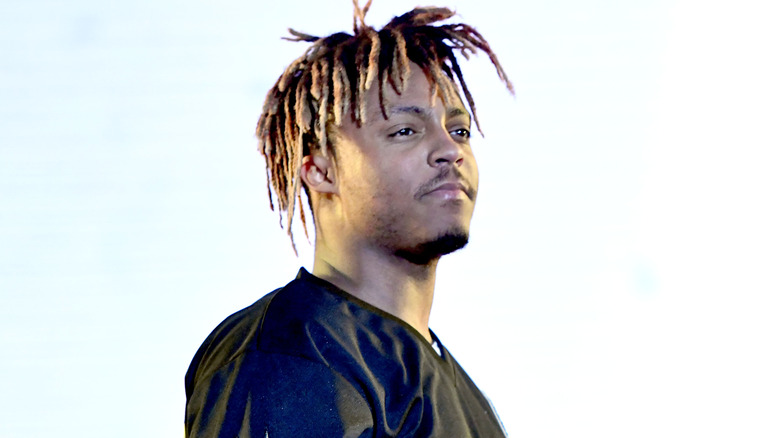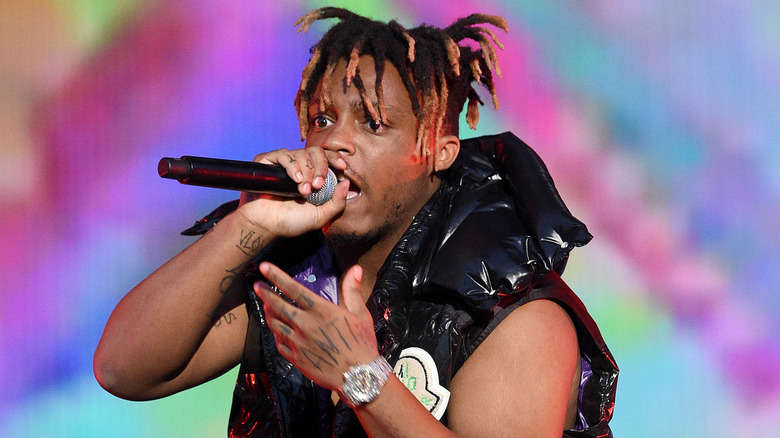Tragic Details About Juice WRLD
The following article includes mentions of substance abuse, addiction, and domestic violence.
An icon in the wave of 2010s SoundCloud rappers, Juice WRLD (born Jarad Higgins), started uploading his home recordings as a teenager, and then broke out to the mainstream in a big way with his first full-length studio album in 2018, "Goodbye & Good Riddance," which included the smash hits "All the Girls are the Same" and "Lucid Dreams." Like contemporaries Drake and Post Malone, Juice WRLD melodically half-spoke and half-sung his lyrics, which were usually of an emotional, deeply introspective and confessional nature, placing the rapper at the forefront of the "emo" rap movement. He was also remarkably prolific, releasing a total of four solo studio albums (two while living and two posthumously) and multiple mixtapes and EPs — all in a span of just a few years.
In 2019, just one year after his commercial breakthrough, Juice WRLD was named Billboard's Top New Artist. Sadly, he wouldn't get to prove his staying power or show off his musical gifts beyond that initial body of work. Juice WRLD died at age 21, before the year was over. Here's a look into the brief but tragedy-plagued life of the beloved rapper and musician.
Juice WRLD endured anxiety and depression
Alexia Smith, Juice WRLD's partner for most of 2018, told the Daily Mail that the late rapper used Percocet and prescription cough syrup to self-medicate against anxiety and depression, which she said stemmed from him feeling misunderstood and alone. "How can you beat depression without having friends and family to support you? Is it possible?" read an article title he once posted on a private Instagram account. "He would tell me, 'I need help, I need help. I'm telling people I need help and nobody believes me,'" Smith recalled.
Juice WRLD's mother, Carmela Wallace, told GQ that her son had regularly seen a psychologist as a teenager, and in observation of World Mental Health Day in October 2020, Wallace published an open letter. "Jarad and I often had frank discussions about his struggles with addiction, anxiety and depression," Wallace wrote (via Rolling Stone). "...I know he truly wanted to be free from the demons that tormented him."
The number "999" was significant to the late rapper and his mental health issues. "999 represents taking whatever hell, whatever bad situation or whatever struggle you're going through and turning it into something positive and using it to push yourself forward," he told MTV in 2018 of the number's meaning, which he also had tattooed and used in the name of his first EP. In that spirit, Wallace launched Live Free 999, a resource guide for parents of children seeking assistance for mental health issues.
If you or someone you know is struggling with mental health, please contact the Crisis Text Line by texting HOME to 741741, call the National Alliance on Mental Illness helpline at 1-800-950-NAMI (6264), or visit the National Institute of Mental Health website.
Juice WRLD was allegedly a domestic abuser
For the better part of a year, Juice WRLD dated Alexia Smith. They first connected in early 2018, before the rapper's meteoric rise to fame, and ended their romantic relationship in October of that year, but remained close and in each other's orbit. Smith told the Daily Mail that Juice WRLD's addiction issues cast a dark shadow on their partnership, and that her attempts and urgings to help him quit drugs would lead to fights, which soon turned violent and abusive.
"It was both ways, I admit it," Smith said in a since-deleted YouTube video. "I'd like to make it clear that Jarad never beat me, never put a fist to my body," she added, then divulged that he picked her up, knocked her into a wall, and left bruises on her arms. "He shoved me into a bathtub where I hit my head on the wall when we were fighting on the tour bus," Smith reported. "His friends had to pull him off of me and I ended up with the bruise and cuts." The relationship ended not long after, with the violence being a major contributing factor to its demise. "It's not that we didn't love each other, it just wasn't healthy anymore," Smith said.
If you or someone you know is dealing with domestic abuse, you can call the National Domestic Violence Hotline at 1−800−799−7233. You can also find more information, resources, and support at their website.
Juice WRLD had drug addiction issues
In an interview with Billboard, Juice WRLD explained that he first tried drugs, as a means of mental and emotional escape, as a sixth-grader, learning about an intoxicating narcotic concoction called lean from the music of Future. "My father wasn't in the picture like that. So listening to this grown-a** man rap about lean, I'm like, 'Well, that sounds really appealing.'"
Lean, according to the National Institute on Drug Abuse, mixes soda with a narcotic, prescription cough syrup in which the active ingredient is codeine and/or promethazine. Juice WRLD called his frequent use a "horrible habit" when speaking with Billboard, while his former partner, Alexia Smith, told the Daily Mail that the rapper would ingest up to three painkiller pills at once.
Juice WRLD's drug use alarmed his inner circle. His co-manager, Peter Jideonwo, told GQ that in efforts to seek treatment for the rapper's addiction, the team had doctors examine Juice WRLD anywhere from 20 to 30 times. Friend and recording engineer Max Lord shared that before the rapper's death, associates staged an intervention. "I and a couple other people had come to him in tears, like, 'We're worried about you, and we're scared we're going to lose you if you keep up these habits,'" Lord added. Juice WRLD agreed to check himself into a treatment facility, with an entry date of December 22, 2019. "That was the soonest they were available to get him in," Lord said.
If you or anyone you know is struggling with addiction issues, help is available. Visit the Substance Abuse and Mental Health Services Administration website or contact SAMHSA's National Helpline at 1-800-662-HELP (4357).
Juice WRLD died of a drug overdose
According to the Associated Press, Juice WRLD and about 12 other people, primarily members of his entourage, boarded a private plane in Los Angeles, bound for Chicago's Midway International Airport. After receiving notice that the plane had numerous guns and a substantial amount of illegal drugs on board, federal agents and local police met the vehicle upon touchdown at about 2 a.m. on December 8, 2019.
A detection dog indicated the presence of drugs in unloaded bags placed on a luggage cart, and a search uncovered marijuana, "bottles of prescription cough syrup, three guns," and ammunition (per the Associated Press). While the search was underway, Juice WRLD experienced convulsions, and after an associate revealed that the rapper was under the influence of Percocet, a strong, opioid-based prescription painkiller, a federal agent administered a dose of Narcan, an emergency medicine that can stop or relieve a drug overdose. The rapper briefly regained consciousness before slipping away, and he was sent to Advocate Christ Medical Center in the Chicago suburb of Oak Lawn. Juice WRLD was pronounced dead at 3:15 a.m.
Per a tweet from Illinois' Cook County Medical Examiner's Office, Juice WRLD's death was ruled accidental. The cause of death: "oxycodone and codeine toxicity," or a fatal overdose from the combination of ingesting two extremely potent opioid-type prescription drugs.
If you or anyone you know is struggling with addiction issues, help is available. Visit the Substance Abuse and Mental Health Services Administration website or contact SAMHSA's National Helpline at 1-800-662-HELP (4357).

